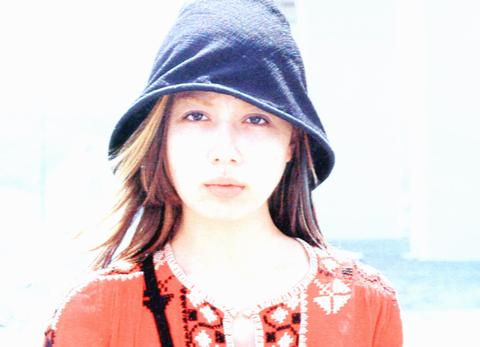She dresses in a thin bright-red silk robe, paints her face a palid white with darkened gothic eyes and lies on a deserted railway, murmuring and repeating "Tomorrow is my birthday." The next day she repeats the same line, only with green eyes, newly dyed hair, and while standing on a roof.
She is 21-year-old Ayako Fujitani starring in the film Ritual, based on her own novel Escape Dream. The movie seems to be her attempt to expose her desire for art, both in her neurotic acting and her writing. Although somewhat dense and self-indulgent, for non-Japanese viewers the movie provides a new angle from which to see the actress, who is usually simply known as the daughter of action film star Steven Seagal.

PHOTO: COURTESY OF GOLDEN HORSE FILM FESTIVAL
The film is also a recognition of artistic achievement for director Hideaki Anno. Having directed two exquisite animated films, Nadia: The Secret of Blue Water (1990) and New Genesis Evangelion (1995), as well as two feature films, one of which was awarded Best Artistic Contribution at the 2000 Tokyo Film Festival, in Ritual he presents one poetic shot after another, all rich in symbolic meaning. Anno's unique and beautiful scenes instill a fresh feeling to the otherwise slightly flat story.
The story begins with a famous director who has a case of writer's block and decides to return to his hometown for inspiration. There he finds a girl lying on an abandoned rail track. She lives alone in a ruined office building and performs strange rituals, either on the tracks, on a roof, or in the flooded basement of her building, constantly repeating the line: "Tomorrow is my birthday." Drawn by her strange behavior and craziness, he begins a one-month visual diary about this girl, filming her with his hand-held camera. He also begins to live with her.
The more the director films the strange teenage girl, the more involved he becomes in her world and in the evidence of her traumatic childhood and family relations. She has a sharp-tongued mother who was deserted by the father and vents her anger and bitterness on the two daughters. Her sister, who is always considered superior and has only a distant affection toward her, has always been her egoistic nightmare. So she engages in her daily ritual, dressed in crazy glamorous outfits, as a means of disavowal.
There is a strong sense of desolation and obsession in morbid beauty during the 30-day love affair between the creatively stumped director and the mentally hurt young girl. The intensity of the girl's dark psychological condition is emphasized through Anno's use of strong colors and theatrical visual presentation. And the wide-angle shots of the two characters lying on the railways, walking by the factories, watching the sky and the sun reinforce the atmosphere of solitude and the sealed worlds of the two characters.
The film's heavy poetics save the film from being a melodrama in which the male character heroically saves the fallen angel, solves her family problems and teaches her how to love, and ultimately finds new inspiration. The resolution the two reach at the end is anything but sappy.
Screening Note
What: Ritual
When: Today 2:30pm
Where: Carnival Theater, 52, Omei Street, Taipei

JUNE 30 to JULY 6 After being routed by the Japanese in the bloody battle of Baguashan (八卦山), Hsu Hsiang (徐驤) and a handful of surviving Hakka fighters sped toward Tainan. There, he would meet with Liu Yung-fu (劉永福), leader of the Black Flag Army who had assumed control of the resisting Republic of Formosa after its president and vice-president fled to China. Hsu, who had been fighting non-stop for over two months from Taoyuan to Changhua, was reportedly injured and exhausted. As the story goes, Liu advised that Hsu take shelter in China to recover and regroup, but Hsu steadfastly

Taiwan’s politics is mystifying to many foreign observers. Gosh, that is strange, considering just how logical and straightforward it all is. Let us take a step back and review. Thanks to the Chinese Nationalist Party (KMT) and the Taiwan People’s Party (TPP), starting this year people will once again have Christmas Day off work. In 2002, the Scrooges in the Democratic Progressive Party (DPP) said “bah, humbug” to that. The holiday is not actually Christmas, but rather Constitution Day, celebrating the enactment of the Constitution of the Republic of China (ROC) on December 25, 1947. The DPP and the then pan-blue dominated legislature

Focus Taiwan reported last week that government figures showed unemployment in Taiwan is at historic lows: “The local unemployment rate fell 0.02 percentage points from a month earlier to 3.30 percent in May, the lowest level for the month in 25 years.” Historical lows in joblessness occurred earlier this year as well. The context? Labor shortages. The National Development Council (NDC) expects that Taiwan will be short 400,000 workers by 2030, now just five years away. The depth of the labor crisis is masked by the hundreds of thousands of migrant workers which the economy absolutely depends on, and the

If you’ve lately been feeling that the “Jurassic Park” franchise has jumped an even more ancient creature — the shark — hold off any thoughts of extinction. Judging from the latest entry, there’s still life in this old dino series. Jurassic World Rebirth captures the awe and majesty of the overgrown lizards that’s been lacking for so many of the movies, which became just an endless cat-and-mouse in the dark between scared humans against T-Rexes or raptors. Jurassic World Rebirth lets in the daylight. Credit goes to screenwriter David Koepp, who penned the original Jurassic Park, and director Gareth Edwards, who knows